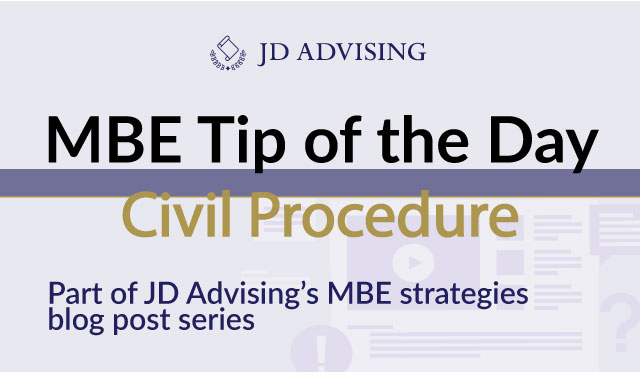MBE Strategies Tip #6 – Civil Procedure
MBE Strategies Blog Post Series: Welcome to our MBE tips and tricks blog post series! In this post, we will cover a Civil Procedure MBE question. Many students find that Civil Procedure MBE questions are among the hardest–in part because they are the least familiar to students and because as of this writing, and in part because there are very few released Civil Procedure MBE questions so it can be tricky to find good questions.
You will see 25 scored Civil Procedure MBE questions on the Multistate Bar Exam.
We will be posting a Multistate Bar Exam question once every couple days along with an answer. This series lasts throughout a bar exam administration and continues when the next administration starts.
Note that these are MBE questions that students commonly get wrong. If you can master these MBE questions, it could increase your MBE score by that many points if you see any of these issues tested again (which, by the way, you will!). These posts of MBE tips and tricks will not only cover substantive law but also strategy. So each post will cover one highly-tested area of substantive law as well as an important MBE strategy. Today, we will review a Civil Procedure MBE question on a topic that is highly-tested. We will also go over how to eliminate incorrect answer choices if you are not sure what the answer choice is.
Do your best to answer this question (before even looking at the answer choices and before looking at the answer below!) Ask yourself: What is the subject? What is the legal issue? What is the rule and analysis? What is the conclusion? Try to answer these beginning questions before even reading the answer choices.
Then, you can uncover the Civil Procedure MBE answer as well as read more about our MBE strategy of the day — to spend more time on the topics that are highly-tested.
Show Civil Procedure MBE question
Civil Procedure MBE Question:
An employee sued her employer for sexual harassment after claiming that the employer made threats to fire her if she did not engage in sexual acts. The employee’s complaint was specific as to the dates and times that the employer threatened her.
The employer moved for summary judgment and stated that the employee was simply upset that she was fired and filed the lawsuit in retaliation. In support of its motion, the employer filed two affidavits. One affidavit was written by the employer and stated that the employee made up the entire incident. The other affidavit was written by the employer’s current secretary who corroborated the fact that the employee had lied about other work-related incidents. The employee failed to respond to the motion.
Should the court grant the motion?
(A) Yes, because the employer supported its motion with affidavits and demonstrated that there was no genuine issue of material fact for trial.
(B) Yes, because the employee failed to respond to the motion.
(C) No, because the employee’s complaint alleged specific facts regarding the harassment.
(D) No, because the affidavits filed by the employer create a factual dispute.
Subject:
Legal Issue:
Legal Rule and Analysis: (If you need to look at your outline to find the legal rule, feel free to use it when you have not yet memorized the subject. Using your outline will help you actively learn and memorize your outline!)
Conclusion:
Look at the answer choices provided. Choose an answer choice that matches your conclusion. Review the other answer choices provided.
Show answer to Civil Procedure MBE question
Answer to Civil Procedure MBE Question:
Common Mistake: Students misunderstand exactly what is needed to prevail in a summary judgment motion.
Subject: Civil Procedure
Legal Issue:Should the court grant the motion for summary judgment?
Legal Rule and Analysis:The court should only grant the motion if there is no genuine dispute as to material fact such that the moving party is entitled to judgment as a matter of law. In this case, there is a genuine issue of material fact (whether or not the woman was credible) and thus the motion should not be granted. The fact that she did not respond is immaterial since she the employer did not meet his burden to begin with.
Remember that a motion for summary judgment requires a burden-shifting analysis. The movant (the person filing the motion) must first show that there is no genuine issue of material fact. Once that burden is met, then the burden shifts to the non-movant to show that there is some kind of genuine issue of material fact for trial. This can be shown via affidavits, deposition testimony, or other admissible evidence.
If the movant never meets its initial burden, then the burden never shifts to the non-movant and the non-movant prevails regardless of whether they respond. In this case, the movant never met its initial burden.
Conclusion: No, because the affidavit creates a factual dispute as to whether the woman was credible.
Choose an answer choice that most closely matches your conclusion and explain why the others are incorrect:(D) is correct.
(A) is incorrect. Simply because a party files affidavits does not mean there is no genuine issue of material fact. The affidavits must show that there is no genuine issue of material fact (and even then, the nonmoving party may still establish a genuine issue of material fact in its response).
(B) is incorrect because the employee does not need to respond to the motion if the employer did not meet his burden of showing there is no genuine issue of material fact. Only if the moving party (the employer) meets that burden is the nonmoving party (the employee) required to introduce evidence that an issue of material fact exists.
(C) is incorrect because a detailed complaint does not automatically mean that a court cannot enter summary judgment in favor of a party. The court will not look at the pleadings when evaluating whether to grant a motion for summary judgment based on no genuine issue of material fact. Rather, the court will evaluate the evidence that is supplied in conjunction with the motion.
MBE Tip:
What if I am really not sure what the correct answer choice is?
- Eliminate wrong answer choices. Don’t guess until you are sure you’ve eliminated any answer choices you know is incorrect – i.e. one that misstates the law or facts, or asks you to make an assumption you are not qualified to make.
- Eliminate answer choices that sound incorrect. Don’t pick answer choices just because they sound good. For example, answers citing the “privileges and immunities clause of the 14th Amendment” are oftentimes incorrect. Same with answers the cite the “best evidence rule.”
- Beware of answer choices that are too definite – and use words like “always” “never” “must” etc. There are almost always exceptions so these overly-definite words are, many times, incorrect.
- When in doubt, choose the longest response. These tend to be right because they more precisely state the legal rule. (But of course they are not always right — like in this case, the longest response is not correct!)
- If the above tips don’t help you, then dissect the answer choices to see if they make sense. It is helpful if you can precisely state the law prior to dissecting the answer choices.
Let’s look at the answer choices provided and dissect them:
(A) Yes, because the employer supported its motion with affidavits and demonstrated that there was no genuine issue of material fact for trial. This is too broad. Just because someone provides an affidavit does not mean that the affidavit is “good enough” to support a motion. I could attach any nonsensical or irrelevant affidavit to a motion and I won’t win because of it!
(B) Yes, because the employee failed to respond to the motion. Many students choose this one because they forget the burden-shifting required. If you were considering this one, step back for a minute and ask yourself “what is the law being tested?” This should help you answer the question correctly.
(C) No, since the employee’s complaint alleged specific facts regarding the harassment. This one does not get to the issue provided. When a motion is filed, the court is going to look at the substance of the motion and the documents attached in support of that motion. The court is not looking at the complaint again.
(D) No, because the affidavits filed by the employer create a factual dispute. This is the correct one! It discusses the motion itself (the affidavit) and gets right to the heart of the matter–that it creates a factual dispute!
Even if you forgot the burden-shifting involved in this kind of motion, you should still be able to eliminate (A) and (C) if you have a general knowledge of motions for summary judgment.
Show summary of two key takeaway points
Key Takeaways for the day:
Takeaway for the Law: Remember that a motion for summary judgment should only be granted if there is no genuine dispute as to material fact such that the moving party is entitled to judgment as a matter of law. If there is any dispute of fact (which is generally credibility on the MBE, or, for example, conflicting testimony) then the motion will not be granted.
Takeaway for Practicing: Even if you are unsure of what the correct answer choice is, still do your best to eliminate incorrect answer choices so you can make a good guess! Do the following:
- Eliminate wrong answer choices – i.e. one that misstates the law or facts, or asks you to make an assumption you are not qualified to make.
- Eliminate answer choices that sound incorrect.
- Beware of answer choices that are too definite.
- When in doubt, choose the longest response.
- If the above tips don’t help you, then dissect the answer choices to see if they make sense.
If you would like to see “MBE tip of the day” posts from prior days, please click on the links below:
Show MBE tip posts from past days
- MBE Strategies: Day 1 – Torts (negligence)–and how to approach MBE questions.
- MBE Strategies: Day 2 – Criminal Law (homicide) — and learning through “wrong” answers.
- MBE Strategies: Day 3 — Evidence (hearsay) –and memorizing the details!
- MBE Strategies: Day 4 – Contracts and Sales – and spending time on the subjects that are difficult for you.
- MBE Strategies: Day 5 – Real Property (future interests) – and spending time on the highly-tested areas of law.
- MBE Strategies: Day 6 – Civil Procedure (summary judgment) – and eliminating incorrect answers.
- MBE Strategies: Day 7: Constitutional Law (political question, standing) – and how to answer a question correctly when you are in between two choices.
- MBE Strategies: Day 8: Evidence (hearsay, best evidence rule) – and why it is good to fine-tune your knowledge of the “red herring” areas of the law.
- MBE Strategies: Day 9: Torts (conversion) – and where to get actual released MBE questions!
- MBE Strategies: Day 10: Criminal Procedure (5th Amendment) – and how to pick between two answer choices.
- MBE Strategies: Day 11: Contracts (contract formation) – and what to do if you “overthink” questions.
- MBE Strategies: Day 12: Real Property (deed delivery) – and jotting out the fact pattern.
- MBE Strategies: Day 13: Civil Procedure (jurisdiction) – and “bringing it all together”.
- MBE Strategies: Day 14: Constitutional Law (taxing and spending) – and why to answer more Constitutional Law and Civil Procedure questions.
- MBE Strategies: Day 15: Constitutional Law (powers of congress) – and how to get better at Constitutional law questions.
- MBE Strategies: Day 16: Criminal Procedure (exclusionary rule) – and paying attention to the call of the question.
- MBE Strategies: Day 17: Evidence (character evidence) – and how to tell a civil case from a criminal case (and why it matters!).
- MBE Strategies: Day 18: Real Property (joint tenancy) – and how to get more Real Property questions right!
- MBE Strategies: Day 19: Civil Procedure (JAAMOL) – and how to learn Civil Procedure.
- MBE Strategies: Day 20: Torts (joint and several liability) – and tips on MBE default rules.
- MBE Strategies: Day 21: Evidence (hearsay) – and the importance of memorizing the law!
- MBE Strategies: Day 22: Contracts (formation) – and why you should not ignore the written portion of the bar exam!
- MBE Strategies: Day 23: Criminal Law and Procedure (and the importance of mens rea).
- MBE Strategies: Day 24: Constitutional Law (equal protection) – and the importance of writing incorrect answers down!
- MBE Strategies: Day 25: Civil Procedure (impleader) – and free released NCBE questions!
- MBE Strategies: Day 26: Real Property (future interests) – and learning the highly tested MBE topics.
- MBE Strategies: Day 27: Torts (intentional torts) – and the importance of learning rule statements.
- MBE Strategies: Day 28: Evidence (impeachment) – and how to keep impeachment, character evidence, etc. straight!
- MBE Strategies: Day 29: Criminal Procedure (line-ups) – and how charts can help you keep the 5th, 6th, and 14th Amendment straight!
- MBE Strategies: Day 30: Contracts (revocation of acceptance of goods) – and how finding patterns in your answer sheet can improve your score.
- MBE Strategies: Day 31: Constitutional Law (public v. private forum) – and last-minute MBE tips.
- MBE Strategies: Day 32: Torts (premises liability) – and eliminating incorrect statements of law.
- MBE Strategies: Day 33: Criminal Law (robbery) – and knowing your state vs. MBE distinctions.
- MBE Strategies: Day 34: Real Property (priority and recording acts) – and writing answers to the questions.
- MBE Strategies: Day 35: Torts (comparative negligence, joint and several liability) – and learning the theories behind the laws.
- MBE Strategies: Day 36: Contracts and Sales (recovering the purchase price) – and creating a timeline of events when answering MBE questions.
- MBE Strategies: Day 37: Constitutional Law (1st Amendment) – and making a diagram as you study.
- MBE Strategies: Day 38: Evidence (extrinsic evidence) – and learning the definitions of basic legal terms.
- MBE Strategies: Day 39: Civil Procedure (motion to dismiss) – and creating a timeline of the judicial process while studying.
- MBE Strategies: Day 40: Real Property (present and future interests) – and the importance of grammar.
- MBE Strategies: Day 41: Torts (battery) – and paying close attention to the call of the question.
- MBE Strategies: Day 42: Criminal Procedure (4th Amendment) – and why you shouldn’t skip straight to the narrow rules.
- MBE Strategies: Day 43: Criminal Law (burglary) – and why you need to know the elements of crimes!
- MBE Strategies: Day 44: Contracts and Sales (damages) – and answering the question in your head first.
- MBE Strategies: Day 45: Constitutional Law (interstate commerce and equal protection) – and paying attention to which entity is attempting to act.
- MBE Strategies: Day 46: Evidence (impeachment) — and how to identify the applicable evidentiary rule.
- MBE Strategies: Day 47: Civil Procedure (full faith and credit clause and preclusion) – and newly released NCBE civil procedure questions.
- MBE Strategies: Day 48: Civil Procedure (removal) – and understanding the policies behind the rules.
- MBE Strategies: Day 49: Real Property (eviction) – and the importance of paying attention to details!
- MBE Strategies: Day 50: Torts (trespass) – and the importance of memorizing the elements and categories of torts.
- MBE Strategies: Day 51: Evidence (lay witness testimony) – and avoiding distractions.
- MBE Strategies: Day 52: Civil Procedure (automatic disclosures) – and eliminating answer choices.
- MBE Strategies: Day 53: Torts (duty of a premises possessor) – and to not feel too sorry for vulnerable plaintiffs!
- MBE Strategies: Day 54: Real Property (equitable servitudes) – and finding differences in concepts.
- MBE Strategies: Day 55: Civil Procedure a bonus FIVE MBE tips!
- MBE Strategies Day 56: Constitutional Law (equal protection) – and memorizing the standards of review.
- MBE Strategies Day 57: Contracts (installment contracts) – and learning the nuances of the law.
- MBE Strategies Day 58: Criminal Procedure (5th Amendment) – and understanding the scope of constitutional rights.
- MBE Strategies Day 59: Civil Procedure (exception to final judgment rule) – and understanding the rules and their exceptions.
- MBE Strategies Day 60: Evidence (which law applies to privileges in federal court) – and the importance of knowing the law.
Looking for additional MBE help?
If you are looking for MBE help, read our 10 expert MBE tips here. Check out our step-by-step guide to improving your MBE score, please review this post for an overview of tips. If you would like to have the next MBE tip emailed to you when we come out with another one, please fill out the form below.
MBE Tip of the Day
Seeking MBE Assistance?
Seeking MBE Assistance?
- 📘 MBE Guide: Equip yourself with our FREE expert-crafted bar exam and MBE guides.
- Free Bar Exam Resource Center: Discover top resources, articles, and free webinars led by renowned bar exam professionals.
Top Resources as Vouched by our Students:
- MBE One-Sheets: One of our most highly acclaimed bar exam supplements!
- Bar Exam Outlines: Our comprehensive and condensed bar exam outlines present key information in an organized, easy-to-digest layout.
- MBE Private Tutoring: Opt for personalized, effective strategies.
- On Demand Bar Exam Course: Comprehensive bar exam preparation.
- Bar Exam Crash Course and Mini Outlines: Acclaimed and effective for a quick refresher.
- MBE Mastery Class, Real MBE Questions, and MBE Guide: Elevate your MBE preparation with these high-quality MBE supplements!
🔥 NEW! Check out our Repeat Taker Bar Exam Course and get introduced to our unmatched platinum Guarantee Pass Program.






Comments are closed.